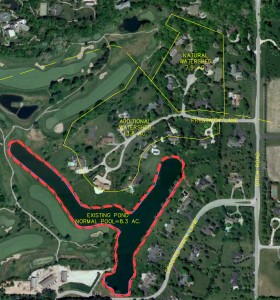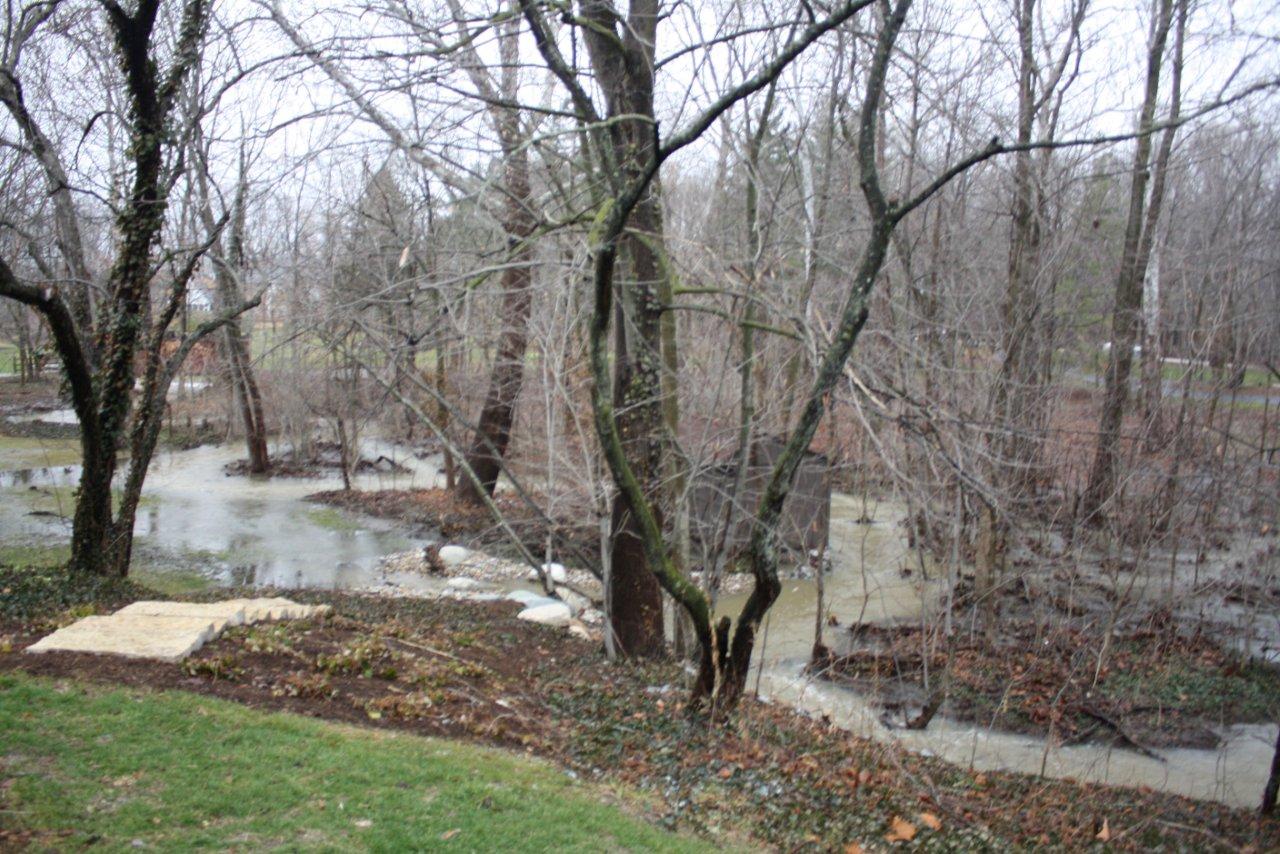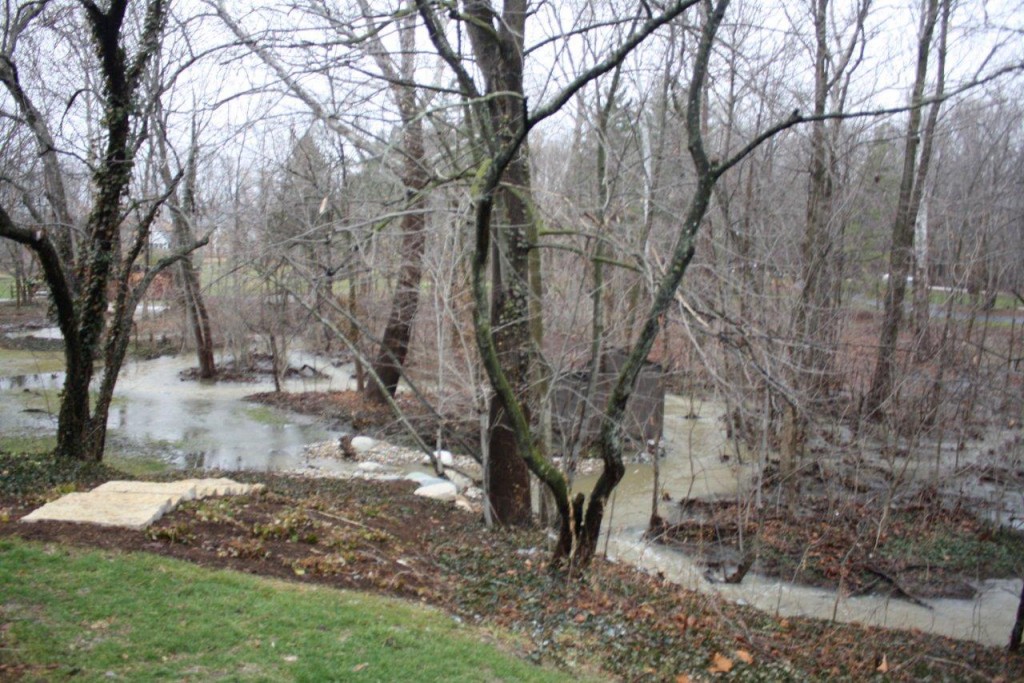Council members unsure why county insists on spending $150,000 for private drainage project
Carmel is trying to prevent Hamilton County from moving forward with a drainage project city officials say should not be publicly funded and might not solve existing problems.
Councilman Ron Carter said the county’s drainage board plans to spend thousands to redirect storm water flow in Crooked Stick Estates north from the Thomas Hussey Drain pond to the Clay Creek Drain. Carter said the proposed project could potentially fix the drainage issues faced by one or two Crooked Stick residents, while presenting new drainage problems for others.
“We’re not into fixing private drainage issues,” Carter said. “(The county) is going to spend $150,000 to fix a drainage problem for two people. It might just be one person.”
A few houses in the neighborhood sit next to the pond, and at least some of their owners are said to experience issues with flooding following heavy rains. County Commissioner Christine Altman, a member of the county drainage board, said this flooding creates “a waterfall effect” in the basement of one of the homes, owned by Tom McCullough, who owns waste management solutions company Terra Limited.
The county’s solution, for which it already has awarded a contract, is to redirect water north and down the street through approximately 1,000 feet of pipe, where it will discharge into a small creek running between other homes.
Not only do City Council members and owners of the homes near the creek say the flooding is a private drainage problem that shouldn’t be fixed with public funds, but they also claim the county’s proposal might not solve the existing issues.
These parties all have said they have “no idea” why the county is so determined to proceed with the project.
How we got here

A letter written in October by the council to Altman briefly explains the backstory.
“We understand the County Surveyor’s office was presented with a petition from certain property owners in Crooked Stick Estates asking the County resolve a drainage problem in this neighborhood,” the letter said. “We further are given to understand the Commissioners may have been led to believe this project was one of several identified in Carmel’s Master Drainage Plan for Southwest Carmel; the implementation, to include funding, of which is a requirement of our Annexation settlement agreement with NOAX.”
The letter continues, saying the proposed project is not a problem cited in the Master Drainage Plan and, as a result, the city will not fund it. NOAX, the organization that negotiated the annexation settlement with the city, also has confirmed this project is not part of the plan.
Altman doesn’t claim this specific project is in the drainage plan; instead, she refers to “generic language in the annexation agreement” she said vaguely describes a number of drainage projects in the area.
“One of them was generically described as being in Crooked Stick,” she said. “We advised (the property owners) to file a petition with the drainage board requesting the area be designated a regulated drain and for us to help them, which is standard practice.”
After this, the board asked Carmel to complete and fund the project, and Carter confirmed Altman’s claims that the city’s engineer originally agreed to this request. But only the council can approve the funding. Council President Rick Sharp said the city engineer’s office has since determined the drainage problem is a private issue and not of public concern. City Engineer Mike McBride could not be reached for comment.
In December, the council approved a resolution “affirming the city’s exclusive jurisdiction with respect to drainage matters in Crooked Stick Estates.” Carter, in a memo to his colleagues on the council, wrote his reason for introducing the resolution was the commissioners had “not responded appropriately to the letter” and “…Altman has expressed the County was in fact going ahead with the project.”
Despite the city’s jurisdiction claims, Altman said the fact the area has been designated a regulated drain puts it under county control, citing drainage laws that date back to the 1800s.
Carter publicly informed the council Feb. 6the drainage board had passed its own resolution he said “directly flies in the face” of Carmel’s December resolution.
“They’ve indicated in that resolution they have so much money that, if we won’t pay for that drainage they have proposed, then they will pay for it out of their excess funds,” he said.“The county has taken that action, and it may fall to us to look to legal actions ourselves to protect the city of Carmel.”
Why this project?
Asked to speculate on the county’s motive for being so persistent in pursuing the project, Carter said “I have no idea.” Sharp also said he does not understand why the project is of such great importance to the county.
Altman contends the county is obligated to correct drainage problems if they are feasible and money is available, and since the city is refusing to pay the bill, she said it’s the county’s responsibility to correct the issue.
But Carter and Sharp said the occasional flooding at the two residences – the second owned by Jamie Browning of real estate and development company Browning Investments –is not something that should be fixed with public funds.
 Likewise, Crooked Stick resident Rick Hall said he doesn’t understand why his property, and those of his neighbors, must be altered because the basement of a home down the street from his “was built lower than the pond.”
Likewise, Crooked Stick resident Rick Hall said he doesn’t understand why his property, and those of his neighbors, must be altered because the basement of a home down the street from his “was built lower than the pond.”
“My yard floods all the time, but I’m not asking the county to spend $150,000 to fix it,” Hall said.
Hard rains already overflow the creek that runs behind Hall’s property, he said, and that’s without the county’s proposed work, which he said would remove a number of his trees and “dump millions of gallons of water” into the small creek.
He’s suing the county in attempt to stop the project, or at least allow for dialogue. But he said his main issue with the county is not about the trees he could lose or the additional water; it’s the tactics being used, which he likened to bullying.
Hall said he’s aware an easement runs along his property, and he’s willing to work with his neighbors. But he said the county views the easement as a “blank check” with which it can do whatever it pleases.
Altman said she isn’t aware of any other complaints regarding the proposed project outside of those from Hall and his next-door neighbor. She also said the rest of the subdivision greatly preferred this project to the one originally proposed, which would have lowered the level of the pond by 4 feet and increased its capacity.
“It would have been devastating to the property values and to the golf course,” she said. “That really wasn’t a good plan.”
Additionally, she said the proposed project would resolve drainage problems beyond the two residences, including some at the golf course.
However, Hall produced copies of multiple letters signed by other Crooked Stick residents who state in these letters that the neighborhood does not have a significant drainage problem, and they are not in favor of the project.
The July 25minutes of the drainage board say McCullough originally told the county surveyor’s office “everyone was on board.”
Though Altman says otherwise, Hall and his neighbor, Dave Lemen, said they were not notified of a public hearing on the proposed project. In fact, Hall claims he found out about the project by chance, while online looking up information on the golf course. He said this was about five days before trees on his property were to be removed.
‘It won’t solve the problems’
To be safe, Altman said Hall and Lemen were given additional time to state their concerns, and during this period, Hall commissioned an engineer to review the project. The engineer’s report indicated flooding issues at the homes near the pond might not be resolved by the proposed project, while Hall and his neighbors could potentially see additional flooding.
Based on this, Hall said lowering the pond is the best option, and he has documentation indicating some of the county’s experts agree.
Because he is in litigation with the county, Hall was able to secure e-mails exchanged by county officials in which they, too, suggest the proposed project will not work.
In an e-mail dated June 21, 2010, Christine Kallio, a project engineer with the county surveyor’s office, tells Gary Duncan of the city’s engineering department that the county had been petitioned to make a drain in Crooked Stick regulated, and identifies McCullough as the petitioning homeowner.
“His basement floods and he wants us to reconstruct the drain,” the e-mail continues. “I do not think this will help much because the home was built too low … Lowering the outlet of the pond below the submerged outlet is the best solution, but that would lower the pond 4 feet below the existing level. We would have a major objection from landowners on the pond.”
Lowering the pond would cost approximately $100,000 less than the proposed project, according to a report Kallio presented in April.
In another e-mail to Duncan from February 2011, Kallio says she passed on a third option, which involved replacing McCullough’s drains because he “…didn’t want his side yard landscaping torn up.”
“Why didn’t they pick the best engineering option?” Sharp said. “Why did they pick the best political option?”
The other side
“The engineers picked the solution they think is best. I didn’t,” McCullough said.
McCullough said he is OK with losing trees or having his landscaping disrupted if it would solve the problem, but he said it would not.
He said a poorly-engineered pipe system is the cause of the flooding – not the construction of his basement. After storms, water seeps up from the ground, McCullough said, adding engineers have confirmed the reason is an old corrugated metal pipe. It is intended to take water from a drain at the street to the pond, but is not sloped. Additionally, it outlets into the pond, he said.
“That pipe is relatively flat, if not a negative grade; hence, it never drains,” McCullough said. “It was never engineered to hold water, yet it’s holding water consistently every day, full.”
When McCullough, with his own money, brought in a 6,000-gallon vacuum tanker to drain the pipe, it pumped out gallons of water but never made any progress, he said, because it was pulling water straight from the pond.
“No one will approve today how the system is engineered. You cannot have a pipe discharge under water,” McCullough said.
In the minutes of the drainage board’s April 25 meeting, Kallio confirms McCullough’s description of the problem. She also presents two potential solutions: the one Hall is fighting and the one he is suggesting. The latter would install new pipes at a proper grade as well as lower the pond by 4 feet. She confirms this option would cost about one-third of the price of the other and says, “The landowners are not in favor of this option because there would be removal of large, older trees on the west property line of Mr. McCullough’s property.” Kallio also says in the minutes, the golf course strongly objected to this plan because draining the pond would expose timbers on multiple holes and “they have a major tournament coming up and do not wish to have that inconvenience.”

Despite her comments made in an e-mail a few months earlier, Kallio did not at this meeting express a concern the other option would not work, according to the minutes.
At that meeting, the drainage board approved the currently proposed project. Altman said the board later lost the construction season to put the project on hold and give Hall time to make his case.
“In our opinion, we did not receive any information that would cause us to change course,” Altman said.
She added she has not seen the e-mails in which Kallio and others question the effectiveness of this project, but said, “The information we’ve received shows this is a solution.”
What’s next?
“I’m willing to work with my neighbors, but I’m not willing to lose my trees and have millions of gallons of water dumped on my property for something that won’t work,” Hall said. “People can work together. It’s ridiculous this is in litigation. They’ll spend more on litigation than to fix the problem.”
Right now, all sides agree the legal outcome will determine what happens next, and when. Altman said the county will file a motion for a summary judgment and, depending on what happens in court, could begin work on the project later this year.
What makes this situation even more unique, however, is the legal battle is between two parties very familiar with each other. Hall is an attorney with Indianapolis firm Barnes & Thornburg, and he personally represents the Indiana Association of County Commissioners, of which Altman and the county’s other commissioners – Steve Dillinger and Steve Holt – are members. His wife, Tami, does accounting work for the association.
Rick and Tami Hall allege at least some of the commissioners attempted to affect their employment soon after the couple filed its lawsuit.
 “It is true Steve Dillinger and Christine Altman asked we be fired because we had requested a court review the drainage board’s decision,” Tami said. “Fortunately, we were not terminated. This was a direct effort to hurt our ability to fund the litigation and bully us out of exercising our rights as citizens of Hamilton County.”
“It is true Steve Dillinger and Christine Altman asked we be fired because we had requested a court review the drainage board’s decision,” Tami said. “Fortunately, we were not terminated. This was a direct effort to hurt our ability to fund the litigation and bully us out of exercising our rights as citizens of Hamilton County.”
Carter and Sharp said they, too, had heard this from third party sources close to the situation.
Altman said this is not true.
“No. That’s just incorrect,” she said. “Given the fact he has sued a client … we (the Hamilton County Commissioners) wrote a letter to the board (of the association) requesting they consider if Rick individually should continue representing the association. We did not ask Barnes & Thornburg be removed.
“There’s no vendetta here … We told them the situation and said we don’t think it is appropriate for Rick and Tami Hall to be working for the association.”
What is not being disputed, however, is that the city’s engineering department initially agreed to take on and fund the drainage project.
“I guess that’s my biggest disappointment,” Altman said. “We acted in good faith with the city. They drew a plan and we acted on it. One has to ask why they did the about-face.”
Sharp said Altman continues to assert the project should be completed based on the annexation agreement with NOAX despite his claim it has been proven to her – numerous times, he said –this project is not part of the settlement.
“What right does the county have to inject itself in the middle of a settlement agreement between Carmel and NOAX, an agreement to which they are not a party?” Sharp said. “I’m mystified as to why the county commissioner, who is elected to represent Carmel, is eager to do battle with the city on this issue.”
His colleague on the council said the city might consider taking legal action against the county to halt the project, but Sharp said he also is concerned this drainage situation could set an unfavorable precedent.
“Does this not potentially open the door to anyone in the county with a leaky basement coming to the drainage board and asking for it to be fixed?” he said.
Hall said he thought the issue was over when the city said it would not pay for the project. Now he said he’s concerned about the amount of county tax dollars spent on litigation – and the possibility of others around the county paying to rectify a drainage problem he, and others, are calling a private issue.
“Say there’s a guy up in Sheridan with a $140,000 house, and maybe he has his own drainage issues,” Hall said. “Now he’s going to contribute to a project in Crooked Stick to fix a wet basement?”
McCullough reached out to the board with his problem, and the county ultimately agreed to fix it. He said he’s trying to stay out of the “bigger issues” he said seem to exist between the council and the commissioners, and Hall and the county.
“Everyone’s out here trying to muddy the waters; it’s a drainage issue,” he said. “Every time you bring it back from 10,000 feet to the ground level, it’s still a drainage issue … I think this is a lot larger than just this issue. That’s why I stay out of politics.”




